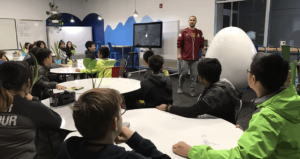Boldly Innovate or Be Badly Irrelevant
I just read a great post by Watchdog editor Mike Klein, which captures the tone and message of a keynote given by former West Virginia Governor Bob Wise, who founded Alliance for Excellent Education, which he gave twice — last week in Atlanta and two days ago in Phoenix at iNACOL.
Wise’s new double alliteration is “boldly innovate or be badly irrelevant.”
Imagine that two little boys were playing ball in the field when the one with freckles said, “When I grow up I’m going to be just like my Dad! He works in the factory putting zippers into blue jeans.” The other little boy without any freckles smiled as only little boys can smile and said, “When I grow up I’m going to be just like my Dad! I don’t know what he does but he wears a suit. I’m going to wear a suit, too!”
Odds are very long that neither little boy would grow up to be just like Dad. Zipper jobs at the blue jeans factory left the country, and whatever job the other little boy’s Dad had was probably reinvented and might also be extinct. The message here is both little boys must be educated for a work world that will continue to evolve, not the one that allowed their Dads to earn steady incomes.
There is widespread recognition this will require new approaches. Learning without borders is the idea public education must embrace technology and new ways to make material available to students. That is the message Wise brought to this past weekend’s conference hosted in Atlanta by the Public Policy Foundation and the Conservative Leadership Policy Institute.
“Be innovative or be irrelevant,” Wise told about 250 state legislators and free market policy advocates. “If you say, I’m going to hunker down, I’m not going to embrace the latest technology, you’ll get through the next couple years but in three to five years you will be badly outdated.”
Wise cited a 2003 Department of Commerce study that analyzed how industries use technology. U.S. education ranked 55th and LAST for technology effectiveness. By comparison, Wise said technology accounted for two-thirds of all productivity growth in the U.S. economy between the years 1995 and 2002.
Wise and former Florida Governor Jeb Bush launched the Digital Learning Council this year to focus on new strategies for digital change in education. Wise is president of the Alliance for Excellent Education, which he joined in 2005 after a single term as West Virginia governor. Bush served for two terms.
The Digital Learning Council’s goal is integrate online and virtual schools, blended learning, personalized learning, social networking and other new technologies into traditional public education as resources to expand current curriculum. Georgia has 452 high schools but, Wise said, the state has just 88 certified physics teachers. “It’s the same in West Virginia,” he said. “It’s the same everywhere.”
Wise punctuated his education keynote with dramatic data to explain three crises in public education: declining state revenues, mounting teacher shortages and increased global demand for skilled workers.
The fiscal crisis is pretty ugly. Total state budgets supported with federal stimulus funds declined more than 2 percent in Fiscal 2009 and almost 4 percent in Fiscal 2010. State budgets without stimulus dollars will decline about 5 percent this fiscal year, 6 percent next fiscal year and 7 percent in Fiscal 2013.
The impact on dollars available to education is clear. “We can’t keep doing the same thing if all we do is the same thing with less dollars,” Wise said. “All we’re going to do is get even less of a result.”
The second crisis is teachers leaving the classroom. Wise said 20 years ago the typical teacher had 15 years experience. Today the typical teacher has two years or less experience. More than one-third of teachers nationwide will be eligible to retire within five-to-seven years. “In the state of Georgia, 43 percent of your teachers are 50 years old or older which means they can exit fairly soon,” Wise said.
Young people who enter teaching are becoming disenchanted fast and leaving sooner than ever before. “We will lose almost half the teachers who enter the classroom this year,” Wise said. “They won’t be there within five years. Those content qualified teachers won’t be moving forward.”
The third crisis is how to move away from education for jobs that require manual labor – remember our Dad who installed zippers – to jobs that require the ability to study information, reach conclusions, work as teams and interact in settings that include global interaction connected by technology. Even factory assembly line jobs now increasingly require technology skills to supervise the robot, not be the robot.
A Georgetown University Center on Education study released last December compared jobs performed in 1973 against skills that will be required in 2018 – a 45-year window. It said 32 percent of 1973 jobs were performed by high school dropouts and 72 percent by dropouts or high school graduates. The study predicted 62 percent of all jobs will require at least some college education within eight years.
But even as most jobs will require more education, the United States college graduation rate is slipping compared to other nations, from second in the world in 1995 to 15th in 2005, Wise said. “It’s not that we’re educating worse. A lot of those who we are competing with are educating better,” Wise said. “They are going harder and stronger. We need to get the college graduation rate up.”
Bush and Wise set a Digital Learning Council goal to prepare 50 million students to become college and career ready. To do that they must overcome current results: 30 percent of high school freshmen drop out and half who graduate are not college or work ready. “Six out of ten finish their high school years without the skills they need to function in a modern society,” Wise said.
Learning without borders – online, personal, blended and social networking instruction models – as part of the instruction model should use education dollars to accomplish at least two goals: benefit students and energize quality teachers to remain in the classroom. The learning community cannot continue to lose its best young teachers within five years and at the same time predict good results for students.
How to integrate learning without borders into traditional settings that might resist new ideas is the challenge being addressed by like the Digital Learning Council and like-minded organizations. “You don’t want to set up an online system that mirrors your brick and mortar system,” Wise warned. “All you’ve done is mirroring what you are trying to improve.”





0 Comments
Leave a Comment
Your email address will not be published. All fields are required.